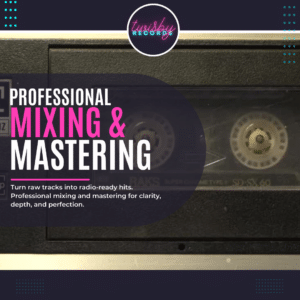Hello again my friends!
I’m going to dive into another one of my favorite topics today: Mastering! More specifically I’m going touch on when you should have your work mastered, how, in general, it should be mastered, and lastly, why it is the important last step in the production process before you are ready to unleash your creation upon the world!
Let’s get right down to it!
When You Should Master A Record

The best time to master a record is after the mixing process is complete. Once the mix engineer has finished their work, they will provide the individual tracks or stems to the mastering engineer. The mastering engineer will then listen to each track to analyze the sonic characteristics of the mix.
One important factor to consider is the sonic consistency of the mix. The mastering engineer will listen to each track to ensure that the tone and volume levels are consistent. If the tracks are inconsistent, the mastering engineer will use equalization and compression to balance them. This is important because a listener will likely be listening to the album or EP from start to finish, and inconsistent mixes can be jarring and take the listener out of the experience.
The mastering engineer will also listen for any potential technical issues in the mix. For example, they will check for phase issues, which occur when there are multiple mics recording the same instrument, and the audio waves don’t match up. This can cause a thin or weak sound, and the mastering engineer will make note of this, and send the song back to the mix engineer to fix these phase issues at the individual multitrack level.
It’s important to give yourself enough time for the mastering process. Depending on the complexity of the project, it can take several days to a week to master a record. Additionally, it’s important to allow time for revisions. Sometimes the artist or producer will listen to the mastered tracks and request changes. Allowing time for revisions will ensure that the final product is the best it can be.
How You Should Master A Record

The mastering process involves a range of techniques and tools to enhance the sound of the mix. Here are some of the most common techniques used by mastering engineers:
Equalization: Equalization, or EQ, is the process of balancing the frequency spectrum of the mix. The mastering engineer will use EQ to ensure that each element of the song is clear and distinct. For example, they may boost the high end of the mix to bring out the clarity in the vocals, or cut the low end to reduce muddiness in the bass.
Compression: Compression is the process of controlling the dynamics of the mix. The mastering engineer will use compression to ensure that the loud parts are not too loud and the soft parts are not too quiet. This creates a more consistent volume level throughout the song.
Stereo enhancement: Stereo enhancement is the process of creating a wider, more spacious sound by widening the stereo image of the mix. This can be done using stereo widening plugins or by using techniques such as mid/side processing.
Loudness: Loudness is an important factor in mastering. The mastering engineer will ensure that the tracks are the appropriate volume level for distribution. Streaming platforms such as Spotify and Apple Music have strict guidelines for loudness, so it’s important to ensure that your tracks meet those guidelines.
Format: Finally, the mastering engineer will ensure that the tracks are in the appropriate format for distribution. This may involve converting the files to the appropriate file format, such as WAV or MP3, and adding metadata such as track names and album artwork.
Why You Should Master A Record

Mastering a record is an essential step in the music production process for several reasons.
Firstly, it ensures that your music sounds the best it can be. The mastering engineer has the experience and the tools to improve the sound quality of your tracks, making them sound clearer, more polished, and more professional. The mastering engineer has an objective perspective and can provide an unbiased evaluation of the mix.
Secondly, mastering ensures that your music sounds good on any playback system. People listen to music on a variety of devices, from high-end speakers to earbuds, and the mastering process ensures that your music sounds good on all of these systems. The mastering engineer will make sure that the mix translates well across different playback systems, so that your listeners can enjoy your music no matter how they are listening to it.
Thirdly, mastering helps to create a consistent sound across an album or EP. By balancing the volume levels and tonal characteristics of each track, the mastering engineer ensures that the entire album or EP flows smoothly and sounds cohesive.
Finally, mastering prepares your music for distribution. Streaming platforms such as Spotify and Apple Music have strict guidelines for loudness and file formats, and the mastering engineer will ensure that your tracks meet those guidelines. By preparing your music for distribution, you can ensure that it will sound great no matter where people listen to it.
It All Makes Sense Now!

Mastering is viewed as this mystic art, even by some of us that live and work in this industry everyday. Nothing could be further from the truth! Mastering is just the less sexy side of music production. The final stop for QC of a song, final subtle enhancements, not meant to fundamentally change the mix that was approved by the artist/label. Data entry for archival and distribution purposes, etc. etc.
A.I. has come a long way, and automated tools can claim to take the place of a living, breathing, human being in putting the finishing touches on a great mix to get it ready for distribution. But, one thing these A.I. tools CANNOT do, as of yet, is give your music life and shine, and the data entry. Metadata is supremely important, especially if you are trying to use your music to get yourself some checks in the mail. I’ll do a deep dive on Metadata at some point in the near future here. As far as giving your music life, AI only uses preset algorithms to make your song sound like other songs. It’s more of a shotgun approach than a scalpel, it doesn’t understand the nuances of your track like a human would.
If you’d like to check out what we can offer Mastering wise, just click this link!
I hope you’ve found this post fun and informative. Be on the lookout for more posts from me!
-John
















